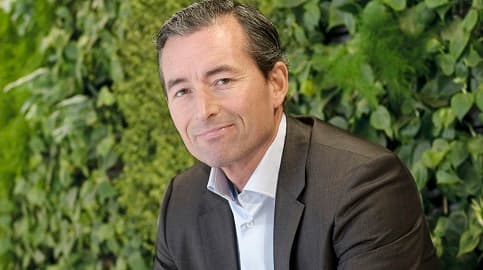CEO: Bromma 'essential' for Skanska's success
The future of Bromma Airport has sparked a torrent of political debate, with supporters arguing it’s essential for Sweden's connectivity. But it’s more than that, says Skanska Sweden’s CEO Pierre Olofsson. It’s also critical for work-life balance.

Sweden has a reputation for being a global leader when it comes to work-life balance.
Working conditions for employees are good, and most Swedes are members of a union. Sweden has one of the lowest gender gaps in the world, highest levels of maternity leave, generally five weeks of paid vacation a year, and plenty of bank holidays and long weekends.
And while the roots of work-life balance may lie deep within the Swedish Model, a country as large as Sweden needs something else to make it work: connectivity.
“We have employees who live in the southern part of Sweden, like myself, and others who live in the north,” Pierre Olofsson, CEO of Skanska’s operations in Sweden, tells The Local. “And we have our headquarters in Stockholm. So travel is essential.”
Skanska, Sweden’s largest construction company, was established in Malmö, southern Sweden, in 1887. Olofsson came onboard in the early 1990s, and became CEO of Swedish operations in 2012.
SEE ALSO: 'Sweden must embrace openness and diversity'
But the career move would have been unfeasible without domestic connectivity, he says.
“I fly from Malmö Airport to Bromma Airport several times a week,” Olofsson explains. “My family is in Lund, and I have to be able to go home and help my kids with their homework. Bromma gives me the opportunity to combine the daily work and family life.”
In fact, Skanska’s employees in Sweden take more than 1,000 flights per month, travelling to various projects, the central office in Stockholm, and back home to every corner of the country. Many of them land at Bromma Airport, which has been threatened by new government housing proposals.
“People who live in Gothenburg, Malmö, or Kiruna need fast access between the office and the airport,” the Skåne native says. “It’s essential for work-life balance.”
Skanska subscribes to the old adage that time is money – but in typical Swedish fashion, profit does not come at the expense of free time and family values.
“Taking the train from Malmö to Stockholm takes four to five hours,” Olofsson explains. “We need to be able to travel, and to travel fast. It will be another 20 years, probably, before Sweden has good trains.”
From door to door, Olofsson’s trip takes under two hours. After commuting back and forth between Lund and Stockholm for ten years, Olofsson even has a routine set up:
“It’s a real part of my life,” he says. “I arrive in the morning at Malmö airport, leave my luggage, eat my breakfast on the plane, say hello to the staff, read Dagens Industri, and then prepare myself for meetings. It’s great.”
Ever aware of the environment, Skanska also climate compensates every one of those 1,000 flights taken by its employees each month.
SEE ALSO: 'Sweden must connect the dots with India'
“Sustainability is one of our core values, and it’s a part of everything we do,” Olofsson says. “We have very high goals when it comes to being green.”
Those sorts of policies helped Skanska win accolades as the greenest company in the UK in 2011 - a remarkable achievement for a construction company. Skanska was also commended in 2014 by the Financial Times for its corporate environmental responsibility.
Indeed, since Skanska went international in the 1950s (dropping its Skånska ‘å’ for an a), the company has had an enormous global impact, coming in as the ninth largest contractor in the world in 2013.
”It all started here in Sweden, but today we are a worldwide company,” Olofsson says.
International divisions of Skanska also collaborate on projects, with Skanska UK and Skanska Sweden currently working together on the New Karolinska Solna, a new university hospital in Stockholm and the European Spallation Source in Lund.
But Olofsson says it would be “impossible” to run Skanska today without Bromma Airport.
“I think it’s a bad idea to close down Bromma Airport,” Olofsson remarks. “We need to have good connectivity within our own country, as well as with other countries. There is no better option than keeping Bromma.”
The airport, which opened in 1936, is currently a domestic hub in Sweden, with links to thirteen destinations, including Malmö, Gothenburg, and Kiruna. According to Olofsson, closing the airport would complicate the lives of thousands of Skanska employees – as well as impacting Stockholm, and Sweden, in broader ways.
“Stockholm is an important market and meeting place, and Bromma is extremely important for the industrial sector,” Olofsson explains. “It’s not just Skanska. Many of Sweden’s biggest companies have their headquarters here. And we have to watch out, because if we close down Bromma Airport they might move.”
Olofsson himself would lose about an hour each way if domestic traffic were transferred to international Arlanda Airport. But the repercussions are much greater than that.
“It actually plays in on the global scale as well,” he says.
“Arlanda has everything to win by becoming even more international. But if someone comes from the UK or the US to a big airport like Arlanda and then needs to fly within the country, we need that domestic capacity. Otherwise they have to take the train.”
Olofsson added that connectivity will be even more important for the company in the future.
“It’s a global company, so it’s important we have international connectivity,” he says.
“We’re investing a lot in the US market, so it will become even more important for us to be able to fly direct to more places over the Atlantic.”
Addressing arguments put forward by some politicians that the land occupied by Bromma Airport would be better used for housing, Olofsson explains that Stockholm’s infrastructure and residential issues need to go hand in hand – not cancel out one another.
“The infrastructure, residential homes, the growth of a company…everything is connected,” he says.
As a construction company, Skanska’s success is closely linked to the growth of the city itself, but Olofsson points out that there are many other places where homes could be built.
“But if you don’t have the infrastructure, people will not buy the homes anyway. Politicians need to come up with a long term solution for connectivity.”
And that solution should not include severing the links of thousands of Swedes to their families and jobs, Olofsson says.
“Infrastructure drives growth and investments. In order for Sweden to compete with big business regions in other parts of Europe, we need to have efficient ways of commuting, including air transportation. “
This article is part of an ongoing series produced by The Local in partnership with ConnectSweden.
This content was paid for by an advertiser and produced by The Local's Creative Studio.

Join the conversation in our comments section below. Share your own views and experience and if you have a question or suggestion for our journalists then email us at [email protected].
Please keep comments civil, constructive and on topic – and make sure to read our terms of use before getting involved.
Please log in here to leave a comment.